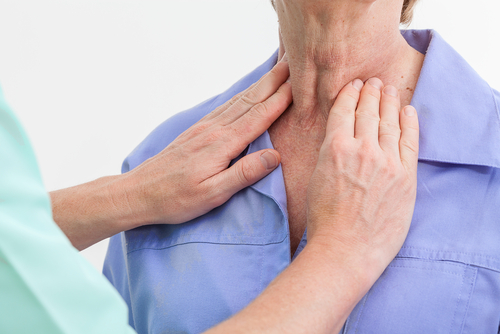
The thyroid gland is a small, butterfly-shaped organ located in the base of your neck. It releases hormones that control almost all of the metabolic processes in your body—metabolism refers to the way your body uses energy. Vital body functions regulated by the thyroid gland’s hormones include your breathing, heart rate, central and peripheral nervous systems, body weight, muscle strength, menstrual cycles, body temperature, and cholesterol levels.
The thyroid gland uses iodine from our diet to make two main hormones: Triiodothyronine (T3) and Thyroxine (T4). It is important that T3 and T4 levels are neither too high nor too low. The most common thyroid problems involve abnormal production of thyroid hormones.
Hyperthyroidism (overactive thyroid)
Too much thyroid hormone results in a condition known as hyperthyroidism or overactive thyroid. Hyperthyroidism can mimic other health problems, which may make it difficult for your doctor to diagnose. It can also cause a wide variety of signs and symptoms, including:
Sometimes an uncommon problem called Graves’ ophthalmopathy may develop, especially among smokers. Signs and symptoms of Graves’ ophthalmopathy include:
Older adults are more likely to have either no signs or symptoms or subtle ones, such as an increased heart rate, heat intolerance and a tendency to become tired during ordinary activities. Medications called beta blockers, which are used to treat high blood pressure and other conditions, can mask many of the signs of hyperthyroidism.
See a doctor if you develop any of these symptoms.
Hypothyroidism (underactive thyroid)
Insufficient hormone production leads to hypothyroidism or underactive thyroid. The signs and symptoms of hypothyroidism vary, depending on the severity of the hormone deficiency. But in general, any problems you have tend to develop slowly, often over a number of years.
At first, you may barely notice the symptoms of hypothyroidism, such as fatigue and weight gain, or you may simply attribute them to getting older. But as your metabolism continues to slow, you may develop more-obvious signs and symptoms.
Hypothyroidism signs and symptom may include:
When hypothyroidism isn’t treated, signs and symptoms can gradually become more severe. Constant stimulation of your thyroid gland to release more hormones may lead to an enlarged thyroid (goiter). In addition, you may become more forgetful, your thought processes may slow, or you may feel depressed.
Advanced hypothyroidism, known as myxedema, is rare, but when it occurs it can be life-threatening. Signs and symptoms include low blood pressure, decreased breathing, decreased body temperature, unresponsiveness and even coma. In extreme cases, myxedema can be fatal.
See a doctor if you develop any of these symptoms.
-Medical Observer
Overweight and obesity are defined as abnormal or excessive fat accumulation that presents a risk to health. A body mass […]
Around 27 million Filipino adults are overweight or obese, according to the latest National Nutrition Survey conducted by the Food […]
Advances in scientific and technological knowledge have provided unprecedented advantages in terms of immeasurable convenience in our daily living, lightning-fast […]